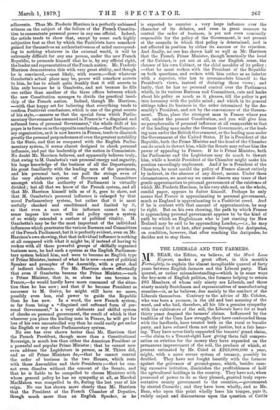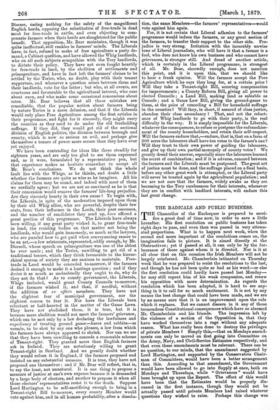THE LIBERALS AND THE FARMERS.
1VER. BEAR, the Editor, we believe, of the Mark Lane 111. Express, makes a great effort, in this month's Fortnightly, to explain the almost inexplicable quarrel of forty years between English farmers and the Liberal party. That quarrel, or rather misunderstanding—which is in some ways the key-note of English politics, the farmers helping to return 283 Members, of whom only ninety are Liberals, and those ninety mainly Scotchmen and representatives of manufacturing counties—is, as he believes, due mainly to the conduct of the Liberals themselves. Contrary to the advice of Mr. Cobden, who was born a yeoman, in the old and best meaning of the word, and who had, therefore, all his life a genuine sympathy with the cultivators of the soil, the Liberals have for at least thirty years despised the farmers' claims. Influenced by the tradition of the Corn Law struggle, they have confounded them with the landlords, have treated both as the rural or bucolic party, and have refused them not only justice, but a fair hear- ing. They have never fairly supported the tenants' grand claim, —the claim to a Tenant-right Law giving them full compen- sation on eviction for the money they have expended on the permanent improvement of the soil, the produce of which, at present estimated by Mr. Caird at £263,000,000 a year, might, with a More secure system of tenancy, possibly be doubled. They have not fought heartily with the farmers against the grievance of ground-game, which, besides caus- ing excessive irritation, diminishes the profitableness of half the agricultural holdings in the country. They have not, when possessed of power to do as they pleased, granted truly repre- sentative county government to the counties,—government by elected Councils ; and they have been wholly, and as Mr. Bear, who upon this point wholly loses his temper, puts it, rudely unjust and discourteous upon the question of Cattle Disease, caring nothing for the safety of the magnificent English herds, opposing the substitution of free-trade in dead meat for free-trade in cattle, and even objecting to com- pensate farmers when their herds are slaughtered for the public benefit. That opposition, Mr. Bear maintains, though it was quite ineffectual, still rankles in farmers' minds. The Liberals have, in fact, refused to make of free agriculture a party de- mand, a Cabinet queition, and have allowed the Whig landlords, who on all such subjects sympathise with the Tory landlords, to dictate their policy. They have not even fought heartily for free-trade in land, by the abolition of settlements and primogeniture, and have in fact left the farmers' claims to be settled by the Tories, who, no doubt, play with their tenant supporters, and whenever a question arises between them and their landlords, vote for the latter ; but who, at all events, are courteous and favourable to the agricultural interest, who care about oxen, and who make some occasional concessions about rates. Mr. Bear believes that all these mistakes are remediable, that the popular notion about farmers being by nature Tories is a mere delusion, and that if the Liberals would only place Free Agriculture among the first articles in their programme, and fight for it sincerely, they might carry the counties as they used to do under the old freeholding suffrage. If they did, they would get rid of the sectional division of English politics, the division between borough and county, which is now so serious an evil, and perhaps give themselves a tenure of power more secure than they have ever yet enjoyed. We have been contending for ideas like these steadily for eighteen years, and are only too glad to see them expressed and, as it were, formulated by a representative pen, but that experience makes us hesitate somewhat to accept all Mr. Bear's conclusions. We do not think the whole fault lies with the Whigs, as he thinks, and doubt a little whether the farmers are quite as wise as he imagines. All his claims for them may be sound, and indeed with most of them we cordially agree ; but we are not so convinced as be is that their concession would remove the farmers' life-long prejudice. Are they sincerely hearty in their own cause To begin with, the Liberals, in spite of the moderation imposed upon them by their old Whig allies, who are powerful, despite their few seats, from their influence in the Lords, their past successes, and the number of candidates they send up, have offered a great portion of this programme. The Liberals have always been willing, if any great party wished it, to grant free-trade in land, the resisting bodies on that matter not being the landlords, who would gain immensely, so much as the lawyers, who are puzzled how to get paid when conveyancing ceases to be an art,—a few aristocrats, represented, oddly enough, by Mr. Disraeli, whose speech on primogeniture was one of the ablest he ever made ; and the Tories, unwilling to get rid of a traditional tenure, which they think favourable to the hierar- -chical system of society they are anxious to maintain. Free- trade in Land would be conceded to-morrow, if the farmers - desired it enough to make it a hustings question ; and if they desire it as much as undoubtedly they ought to do, why do they not do that? As to county government, the Liberals, Whigs included, would grant County Councils to-morrow, .if the farmers wished it, and that, if needful, without the addition of ex officio members. They have not the slightest fear of municipal government, nor the slightest reason to fear it. Nor have the Liberals been reluctant or half-hearted in the matter of the Game Laws. They have not abolished them, it is true, but it is because mere abolition would not meet the farmers' grievance, which can be met only by a law declaring the lawfulness and expediency of treating ground game—hares and rabbits—as vermin, to be shot by any one who pleases, a law from which the farmers have always appeared to shrink. Nor can we see that they have been unwilling to concede a reasonable scheme ef Tenant-right. They granted more than English farmers ask in Ireland. They are notoriously willing to grant Tenant-right in Scotland. And we greatly doubt whether they would refuse it in England, if the farmers proposed and insisted on any substantial measure. It is true, they have not proposed one themselves ; and if Mr. Bear will reflect, that is, to say the least, not unnatural. It is one thing to propose a measure of justice at one's own expense because it is demanded by a large body of electors, and another to propose it when all those electors' representatives resist it to the death. Suppose Lord Hartington to be self-sacrificing enough to bring in a Tenant-right Bill to-morrow, every county Member would vote against him, and in all human probability, after a dissolu- tion, the same Members—the farmers' representatives—would vote against him again.
For, it is not certain that Liberal adhesion to the farmers' programme would induce the farmers, or any great section of the farmers, to transfer their support to the other side. Pre- judice is very strong. Irritation with the incurably unwise tone of Liberal journalists, who will have it that a farmer is a fool, who does not know his own business and who cannot have grievances, is stronger still. And dread of another article, which is certainly in the Liberal programme, is strongest of all. Mr. Bear, shrewdly enough, does not mention this point, and it is upon this, that we should like to hear a frank opinion. Will the farmers accept the Free Agriculture which he says they long for, at a certain price ? Will they take a Tenant-right Bill, securing compensation for improvements ; a County Reform Bill, giving all power to elected Councils ; a Land Bill, making land as saleable as Consols ; and a Game Law Bill, giving the ground-game to them, at the price of conceding a Bill for household suffrage in the counties? Will they, in short, if assured of class justice, abandon their class ascendancy ? That, and not the reluct- ance of Whig landlords to go with their party, is the real difficulty in the way. It is simply impossible for the Liberals, whatever the consequences, to refuse or postpone the enfranchise- ment of the county householders, and retain their self-respect. Will the farmers endure that,—endure, that is, that on a farm of 300 acres the labourers shall have ten votes to the farmer's one? Will they trust to their own power of guiding the labourers, and give up their own partial monopoly of county votes ? We greatly dread their answer, especially since the labourers learned the secret of combination; and if it is adverse, concord between the farmers and the Liberals must be postponed. The great act of justice must be done, and the suffrage placed on a final basis, before any other great work is attempted, or the Liberal party will never be trusted again by the agricultural population; and we are not sure that the farmers, widely awake as they are becoming to the Tory carelessness for their interests, whenever they are in conflict with landlord interests, will endure this last great change.



































 Previous page
Previous page